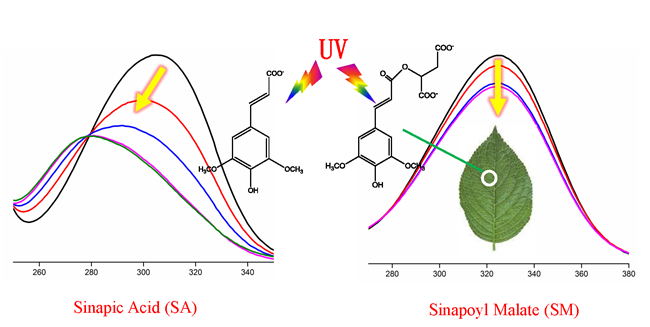Ultraviolet irradiation can induce DNA damages. Plants suffer much more sunlight than animals. As a result, nature has selected efficient screening agents to protect plants. In adult Arabidopsis plants, sinapoyl malate (SM) is deposited in the leaf epidermis to prevent penetration of UV radiation, which is an ester derivative of sinapic acid (SA). However, the photoprotection mechanism of sinpoyl malate in aqueous solution is still unknown.
To understand the photoprotection mechanism, Prof. HAN Keli and his coworkers at Dalian Institute of Chemical Physics, CAS, use the femtosecond transient absorption spectroscopy and time-dependent density functional theory and find the ultrafast photoisomerization mechanism of SA and SM in neutral aqueous solution.

The Photoprotection Mechanism of Plant Sunscreen (Image by LUO Jian)
In the neutral aqueous solution, both SM and SA are deprotonated. Their excited states can relax to the ground states by ultrafast barrierless trans-cis photoisomerization, efficiently dissipating the ultraviolet energy into surroundings. However, the cis deprotonated SA has much lower ultraviolet absorption ability compared to its trans conformer. In contrast, the cis deprotonated SM still absorbs ultraviolet light strongly. Furthermore, the excited-state protonated SA can also decay to the ground state by ultrafast photoisomerization and its cis product still has strong ultraviolet absorption ability. Therefore, the protonated SA can be used as a new sunscreen molecule after proper chemical modification.
The related work was published on the Journal of Physical Chemistry Letters. This study was financially supported by National Basic Research Program of China and the National Natural Science Foundation of China. (Text and Image by LUO Jian)
Contact:
Dr. LU Xinyi
Dalian Institute of Chemical Physics, Chinese Academy of Sciences,
457 Zhongshan Road, Dalian, 116023, China,
Tel: 86-411-84379201
E-mail: luxinyi@dicp.ac.cn